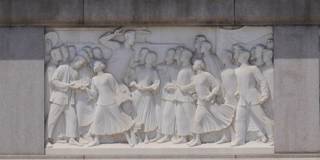This year’s anniversaries of the 1919 and 1989 student protests in China will again highlight the Chinese authorities’ contradictory attitudes toward the two movements. As the People’s Republic looks ahead to the 70th anniversary of its founding this October, the country continues to reckon with its own history.
NEW HAVEN – This is a big year for anniversaries in China. On May 4, the People’s Republic will commemorate the centennial of the May Fourth Movement, the student-led protests in front of Beijing’s Tiananmen Gate in 1919 that marked the birth of Chinese nationalism. And then, one month later, on June 4, will come the 30th anniversary of the violent suppression of pro-democracy student protests on the same site. This milestone, by contrast, will not be officially acknowledged, much less commemorated, in China.
The 1919 demonstrations are immortalized in stone on the Monument to the People’s Heroes in Tiananmen Square. Referring to the same ideals of science and democracy, the protesters in 1989 also presented themselves as loyal to the nation. But the 1989 movement ended in what is known outside China as the Tiananmen Square massacre, and within China as the “Tiananmen incident.” The events of three decades ago are a taboo subject in China, scrubbed by the authorities from the Internet and largely unknown to the country’s younger generation.
It is a persistent contradiction that the Chinese state claims the mantle of May 4 while repressing the memory of June 4. The students of 1919 are celebrated as outspoken patriots, in keeping with a long Chinese tradition that places the intellectual in a role of social responsibility. The ideal scholar of imperial times took great risks to speak truth to power, in order to expose official corruption and spur reform.

NEW HAVEN – This is a big year for anniversaries in China. On May 4, the People’s Republic will commemorate the centennial of the May Fourth Movement, the student-led protests in front of Beijing’s Tiananmen Gate in 1919 that marked the birth of Chinese nationalism. And then, one month later, on June 4, will come the 30th anniversary of the violent suppression of pro-democracy student protests on the same site. This milestone, by contrast, will not be officially acknowledged, much less commemorated, in China.
The 1919 demonstrations are immortalized in stone on the Monument to the People’s Heroes in Tiananmen Square. Referring to the same ideals of science and democracy, the protesters in 1989 also presented themselves as loyal to the nation. But the 1989 movement ended in what is known outside China as the Tiananmen Square massacre, and within China as the “Tiananmen incident.” The events of three decades ago are a taboo subject in China, scrubbed by the authorities from the Internet and largely unknown to the country’s younger generation.
It is a persistent contradiction that the Chinese state claims the mantle of May 4 while repressing the memory of June 4. The students of 1919 are celebrated as outspoken patriots, in keeping with a long Chinese tradition that places the intellectual in a role of social responsibility. The ideal scholar of imperial times took great risks to speak truth to power, in order to expose official corruption and spur reform.